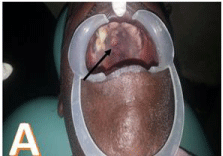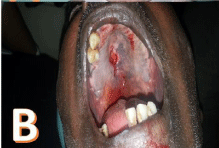
Case Report
J Dent & Oral Disord. 2017; 3(1): 1055.
Smokers Hyperplasia of Hard Palate
Nayak V*, Girish YR, Kini R, Rao PK, Bhandarkar GP and Kashyap RR
Department of Oral Medicine and Radiology, A.J. Institute of Dental Sciences, India
*Corresponding author: Vijayendranath Nayak S, Department of Oral Medicine and Radiology, A.J. Institute of Dental Sciences, India
Received: February 02, 2017; Accepted: March 15, 2017; Published: March 22, 2017
Abstract
Smokers hyperplasia is a disorder associated with cigar and pipe smoking. It is characterized by changes in the mouth caused by the chemicals, heat and friction produced by smoking. The condition is also known as stomatitis nicotina, smoker’s keratosis, smoker’s palate and inflammation causing hyperplasia.
Keywords: Hyperplasia; Tobacco; Smoking
Introduction
Smoker’s palate or nicotina stomatitis palatini is an asymptomatic lesion associated with heavy smoking of tobacco, usually appearing as greyish changes on hard palate, often combined with multiple red dots located centrally in small elevated papule or a nodule. The condition most commonly occurs in males who smoke pipes and cigars. The age group affected is usually above 45 years. The condition is associated with pipe smoking as it tends to produce more heat compared to other forms of smoking. It may also be associated with frequent consumption of very hot beverages but usually there is a history of smoking.
Case Presentation
A 50-year-old male patient comes with a complain of growth on the upper jaw since 5 months. Patient was medically fit and gives history of smoking tobacco in the form of Beedi (Form of tobacco smoking without filter, commonly seen in parts of Asia). Intraoral examination revealed a solitary nodule on the right side of the mid palatine raphe measuring about 5 mm in diameter (Figure 1). Brownish black pigmentation was evident on the surface of the palate surrounding the nodule. Considering the Greenburg et al grading Criteria, A provisional diagnosis of Grade III Smokers palate was given. Excisional biopsy of the lesion was done, and reports confirmed the diagnosis. (Figure 2)

Figure 1: A nodular growth in the palate.

Figure 2: After Excision of the nodule.
Discussion
Tobacco smoking is one of the most common causes of mortality and morbidity in developed and developing countries now [1]. Tobacco smoking and cigarettes cause DNA damage and increase the risk for oral cancer. Smoking is an important risk factor for oral diseases such as oral cancer, periodontal disease, cleft lip, cleft palate, alveolar bone loss, and black hairy tongue [2-4].
The most prevalent normal variations and oral lesions were as follows: Fordyce granules, fissured tongue, leukoedema, varices, frictional hyperkeratosis, smoker’s palates, aphthous stomatitis, oral submucosal fibrosis, oral malignant leukoplakia, median rhomboid glossitis, oral candidiasis, lichen planus, traumatic ulcer, stomatitis, geographic tongue, betel chewer’s mucosa, irritation fibroma, angular cheilitis, and herpreslabialis [5].
Tobacco smoking increases the number of aneuploidnuclei in the oral epithelium and causes oral malignant and premalignant lesions. Therefore, inspection of the oral cavity to find lesions caused by tobacco is a good way to initiate tobacco cessation [6].
Considering the prevalence of oral diseases caused by smoking, smokers palate id the commonest of all. It is a painless condition with changes in the color and consistency of the oral mucosa. Due to the heat produced by smoking, there will be inflammation of the minor salivary glands as reported in the report [7]. Patients identified with smoker’s palate were classified by Greenburg et al. into three grades [8].
- Grade I: Mild- Consisting of red, dot-like opening on blanched area.
- Grade II: Moderate- Characterized by well-defined elevation with central umbilication.
- Grade III: Severe -Marked by papules of 5 mm or more with umbilication of 2-3 mm.
Habit counseling plays a major role in treating such lesions. If it is caused by heat, the lesion is usually completely reversible within a few weeks [9]. Since this condition always develops in the setting of long term heavy smoking, it usually indicates the need for regular observation for cancers associated with smoking [10].
Conclusion
Tobacco has always been the destroyer of human health. Inspite of knowing its ill effects Day to day people end up consuming smoking or smokeless tobacco. Early detection, screening and habit counseling of smokers play important role in stopping the progression of initial mucosal changes to potentially malignant disorders, hence prevent them from cancerous catastrophe.
References
- Musk AW, de Klerk NH. History of tobacco and health. Respirology. 2003; 8: 286-290.
- Khalili J. Oral cancer: risk factors, prevention and diagnostic. Exp Oncol. 2008; 30: 259-264.
- Bánóczy J, Gintner Z, Dombi C. Tobacco use and oral leukoplakia. J Dent Educ. 2001; 65: 322-327.
- Khor GH, Siar CH, Jusoff K. Chromosome 17 aberration of oral squamous cell carcinoma in Malaysia. Glob J Health Sci. 2009; 1: 150-156.
- Mathew AL, Pai KM, Sholapurkar AA, Vengal M. The prevalence of oral mucosal lesions in patients visiting a dental school in Southern India. Indian J Dent Res. 2008; 19: 99-103.
- Benomar S, Boutayeb S, Nitassi S, Hassam B, Ismaili N. Tobacco-associated lesions of the oral cavity and motivation for smoking cessation: a study of 121 cases. Presse Med. 2009; 38: 1746-1749.
- Vellappally, S, Fiala Z, Smejkalová J, Jacob V, Somanathan R. Smoking related systemic and oral diseases.Actamedica (Hradec Kralove). 2007; 50: 161-166.
- Greenburg MS, Glick M, Ship JA. Burket’s Oral Medicine. 1th edition, BC Decker Inc; 2008; 77-106.
- Taybos G. Oral Changes Associated with Tobacco Use. Am J Med Sci. 2003; 326: 179-182.
- Bruch, Jean M., Treister, Nathaniel S. Clinical oral medicine and pathology. New York: Humana Press. 2010.